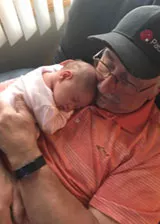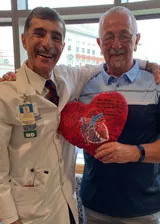
Pat, 66, eats foods that are healthy, doesn't drink or smoke and has always been extremely active and athletic. As the owner of a commercial cleaning company and a one-man show, he is constantly on his feet, moving from one office building to another.
“I work out daily, lift weights, do cardio exercises, love playing golf, with my grandchildren and have a job that is physically demanding,” said Pat. “A few years ago, I began having shortness of breath and feeling lightheaded, and was so surprised to hear from my doctor that I had a medical condition called AFib (atrial fibrillation).”
His doctor prescribed medication that helped until he ended up in the emergency department at MelroseWakefield Hospital with congestive heart failure. After eight days, eight electrical cardioversions and several medication adjustments, Pat’s heart was pumping normally again and he was released from the hospital.
The timing was perfect. Just two days later, Pat was inducted into his high school’s Athletic Hall of Fame for his role-playing on four sports teams: football, basketball, baseball and track. About a month later, as part of his treatment plan, Pat had his ninth electrical cardioversion procedure. He felt much better and was excited to return to his active lifestyle.
The path to an innovative + minimally invasive procedure
Unfortunately, Pat’s AFIB symptoms soon returned. At that point, Pat’s local cardiologist recommended he see Munther K. Homoud, MD, Co-Director of the New England Cardiac Arrhythmia Center at Tufts Medical Center in Boston, and be evaluated for a cardiac catheter ablation. He told Pat that Dr. Homoud, in addition to being one of the best cardiologists around, was “one of the nicest men” he would ever meet.
Pat immediately felt comfortable with Dr. Homoud. Dr. Homoud thoroughly examined him and discovered that he also had a dilated or enlarged left atrium, the upper chamber of the heart that is connected to the lungs. The change in his heart structure meant that extra pressure was being placed on other parts of the heart in order to provide healthy blood circulation throughout his body.
Dr. Homoud explained to Pat that a standard cardiac catheter ablation procedure was not an option for him based on the type of AFIB he had, how long he had it and the size of his left atrium. However, Dr. Homoud said there was an innovative and hybrid procedure he could consider called Convergent, and that he and his Tufts MC team were seeing great results in specific patients with this surgery.
“During this procedure, a cardiothoracic surgeon performs a minimally invasive surgical procedure and a cardiac electrophysiologist performs the standard catheter ablation, combining two different approaches,” said Dr. Homoud. “Convergent may be a good option for patients, such as Pat, who have long-standing persistent or permanent AFIB, and/or changes in the heart structure and haven’t responded to standard treatment.”
He introduced Pat to Senior Cardiothoracic Surgeon Hassan Rastegar, MD, at Tufts MC, who would perform the procedure with him. Both physicians told Pat they were hopeful that Convergent would help relieve his symptoms and resume his active lifestyle. Pat was anxious to move on with his life — the day of his surgery couldn’t come soon enough.
Surgery + the road to recovery

After 13 hours of surgery, Dr. Homoud, Dr. Rastegar and the Tufts MC cardiovascular team successfully finished the minimally invasive procedure. Pat recalled waking up to the “kind, nice and gentle nurses” in the recovery room.
“They were very understanding and made me as comfortable as possible,” said Pat. “The next morning, I heard the great news that I was no longer in AFIB, and my road to recovery began.”
With constant support and encouragement from his care team, Pat worked hard in the hospital to begin his road to recovery.
“Physical therapy started on day two when I first walked about 30 steps with a walker and, while laughing, said I had enough,” Pat remembered. “A few hours later and ready to try again, I actually took 100 steps.”
Less than a week later, Pat went home under the watchful eyes of his family. Within 3 weeks, Pat was back to working full-time cleaning office buildings. He was working out again, too. He credited his quick recovery, in part, to his active lifestyle and always taking good care of himself.
“Creating a small incision in the patient’s abdomen allows us to do this surgery as a minimally invasive procedure that can result in a shorter hospital stay and faster recovery,” said Dr. Rastegar. “Additionally, these patients might eventually be able to discontinue use of their daily heart rate and rhythm medications.”
Recently, Pat learned he had no signs of AFIB and could go off his medication, except for taking a baby aspirin daily prescribed by his doctor. He is back to exercising as much as he did five years ago and he feels like he never had any health problems.
“I could not have gone through this without the help of my exceptional Tufts Medical Center Care Team who supported me every step of the way and made my recovery so much easier,” said Pat. “They will always have a special place in my heart.”